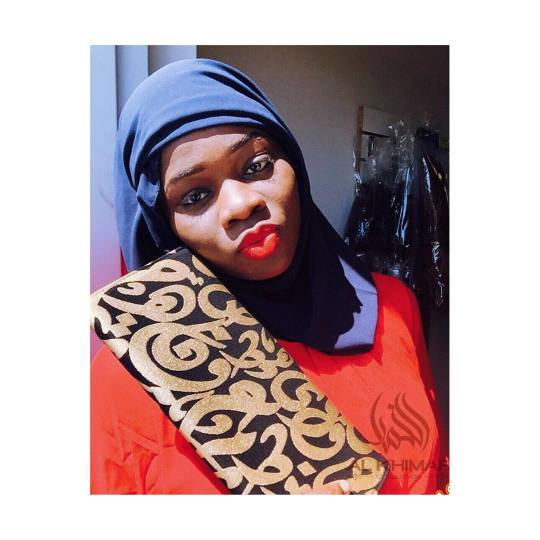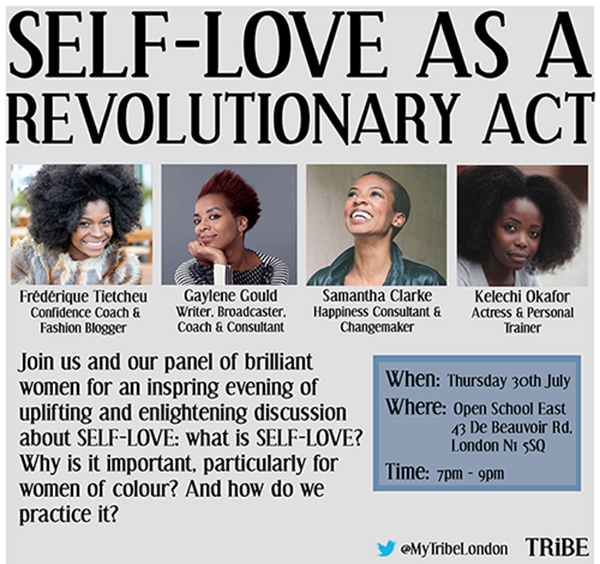
Recently I attended a panel discussion hosted by Seyi Newell of My Tribe London. The company is all about empowering young black women personally and professionally, and they provide very relevant services and events to achieve this aim. Self Love As A Revolutionary Act was the second time they created a safe space for black women to be, and the first time I was exposed to their respectable work. I found out about the discussion through the social media of
Nubian Nights Out, who I wrote about last week. This affirms the effectiveness of word of mouth as a marketing tool, even online. Now I'm using it and continuing the chain reaction to spread what I learnt at the event, according to seven themes:
SELF LOVE IS
respecting and caring about yourself physically and spiritually, which differs for everyone and can only be defined by you - like self respect. Self love is a constant action. The panellist Samantha Clarke really enforced this message that is no doubt meaningful in her career as a Happiness Consultant and Changemaker. She emphasised that self love must be incorporated into your daily life to be effective. As black women, to whom My Tribe's event was tailored, this is extremely important because of the burdens we bear, often for the sake of others before ourselves. There is a lot of negativity associated with selfishness, but this is counteractive when you have self-healing to get on with. This event assured me that it is okay to take time out from people and work on treating myself better, moment to moment and day to day, until it is just how I function.
ENERGY
surrounds us and we must be mindful of that. Who is around you and the vibes they carry are of utmost importance for your spiritual state. Samantha Clarke and Gaylene Gould, who was also on the panel, concurred that if someone makes you feel uncomfortable or is not beneficial for your progression in any way, you've got to be able to move on from them. Being able to say 'no' can be a strong act of self love. Be aware and selective of the energy you create, for example what you speak, and the energy you attract, in terms of people and opportunities. You've got to be able to detach from your environment and connect with yourself. As an audience member said, it is challenging in our metropolitan environment, but find your centre. In my opinion, for black people in general, this entails relearning an African sense of spirituality.
MENTAL HEALTH
has a huge impact on the black community. Gaylene Gould taught me that we have very high rates of schizophrenia. Throughout the discussion black women opened up tearfully and confidently about their personal struggles, for instance with eating disorders, anxiety and depression. My Tribe has to be commended for giving us this space to be vulnerable and receive love in return. The event alerted me to the prevalence and power of sisterhood amongst black women. We find a solace in each other that doesn't exist anywhere else but deep within ourselves. However we each have to improve our communication of our feelings so that this sisterhood can be more wholesome. It can be painful to articulate your emotions in a society that doesn't want to acknowledge them. This is where physical activity can become helpful. Kelechi Okafor, an Actress and Personal Trainer, highlighted the importance of keeping active. This definitely has a correlation with your mental state. Kelechi also advised that everybody practices
GZF Therapy: Give Zero Fucks when you piss people off by loving yourself.
STEREOTYPES
are understandably ubiquitous in a world as huge as ours.This is mad worrying considering how drenched in ignorance they are though. Common views become harmful when they only allow one narrative to reign for a particular identity; they water down the vast individuality that is undoubtedly attached to it. Exhibit A is the 'strong black woman' trope. Hm. During the discussion, contrasting views were expressed in regards to it, although it was unanimous that strength needs to be redefined by and for black women. Inherently we are a loving kind I believe, so we must make space for this love to thrive inside us, and then externalise. It was said that we are 'very resilient because we've had to be'. Somehow society disregarded our struggle and painted black women as aggressive and angry, which is very possibly a (deliberate) misunderstanding of our situation. Nevertheless, we are sensible and know that not everybody is the same, so black women must love ourselves - whether we fit or do not fit stereotypes which will never encompass our glory anyway.
STRENGTH
as a concept is due a makeover regarding black women, like I said. This is probably a process that will take a couple generations to get moving, which would be a strength in itself to achieve. There's hella unlearning to be done, de- and re-constructing our mentalities, because that's where a lot of our strength is. In the mind. (Physically we are very badman too though, don't get it twisted.) Freddie, the Confidence Coach and Blogger on My Tribe's panel, said '
the only best friend you're guaranteed for your whole life is yourself'. To me this means
- lean on yourself and don't seek validation from no one else
- accept guidance from other people but understand that you know your needs best
- hold yourself as highly as you do others; you are just as valuable as anyone in your life
CULTURE
MEDIA



















